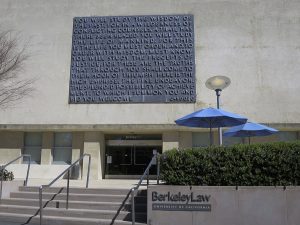Berkeley Clubs Ban Zionist Speakers

The alleged justification for this total ban on all Zionists — that is, people who believe that Israel has a right to exist — is to protect the safety and welfare of Palestinian students. This is patent nonsense. No students have been physically threatened by Zionists, and no student is entitled to be protected from ideas.
Those clubs are engaging in a combination of Stalinism and antisemitism: Stalinism in the sense that they allow no dissenting views from their “politically correct” doctrine of no Israel; antisemitism in the sense that among all the nations of the world which are involved in controversies — Russia, Iran, China, Belarus, to name a few — they have singled out for banning only the nation-state of the Jewish people.
Imagine if a university club were to exclude all speakers who support Black Lives Matter?
The University of California at Berkeley is a public institution. If it in any way supports these organizations — financially or by allowing them to have offices on the campus — then it is effectively the State of California that is enacting and enforcing these bans. This constitutes state action and is governed by the First Amendment. The question is which way the First Amendment cuts. Does it give the clubs the right to exclude all speakers who are Zionists? Or does it prohibit state actors from demanding that all speakers disavow Zionism as a condition to exercising their First Amendment right to speak? And what about the rights of their potential audience members to hear them? The answers may also implicate federal funding for the university.
Clubs and universities generally have a right to choose their speakers, but there is a vast difference between individually deciding who will speak and making a collective decision banning all people of a particular ideology, religion or race…. These clubs are effectively banning most Jews.
The ban is, sadly, also akin to a “loyalty oath” of the kind imposed by McCarthyites in the 1950s and opposed back then by both liberals and civil libertarians.
Universities have an educational and moral duty to foster dialogue and learning, not banning and censorship. Public universities have a constitutional obligation to prohibit religious and ethnic discrimination. Berkeley is failing both tests.
The question remains: is their failure protected or prohibited by the First Amendment?
Universities have an educational and moral duty to foster dialogue and learning, not banning and censorship. Public universities have a constitutional obligation to prohibit religious and ethnic discrimination. The University of California at Berkeley is failing both tests. The question remains: is their failure protected or prohibited by the First Amendment? Pictured: Boalt Hall, UC Berkeley School of Law. (Image source: Art Anderson/Wikimedia Commons)
Do clubs officially sponsored by the University of California at Berkeley School of Law have “Zionist-free zones,” reminiscent of the early 20th century signs that reportedly said, “No Jews or dogs allowed”? Or are these clubs merely exercising their First Amendment rights by banning all Zionist speakers and only Zionist speakers? This is the question that is roiling not only the UC Berkeley campus, but campuses all across the country that see the answer setting a precedent for them.
Let us begin with the undisputed facts.
These clubs have amended their charters to disallow all Zionist speakers — even if they also support Palestinian rights and other progressive causes — and even if they intend to speak on a subject unrelated to Israel. If they are Zionists, they are not welcome to speak at these clubs about anything!

























